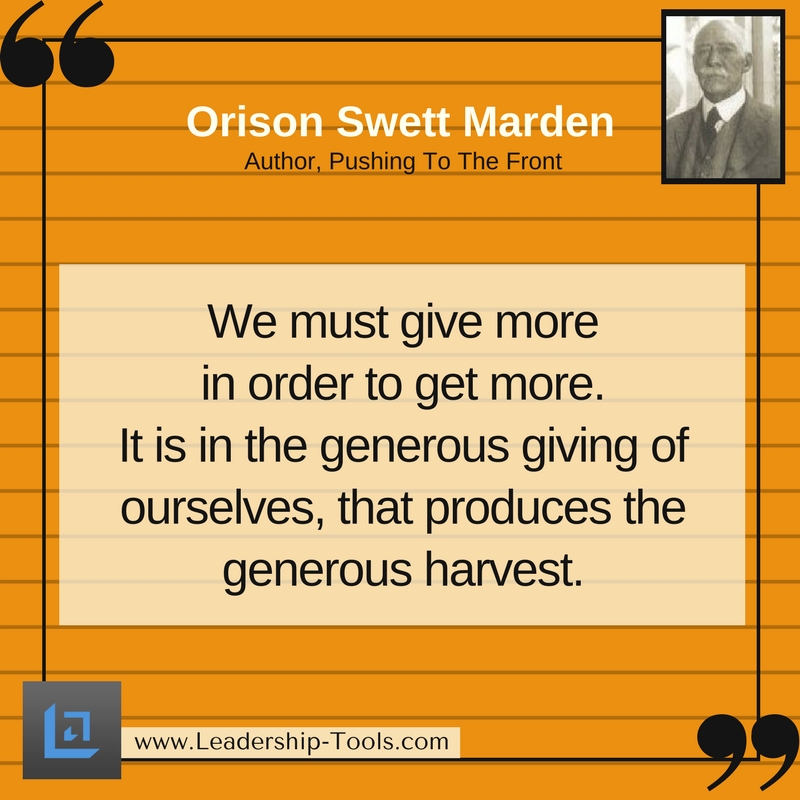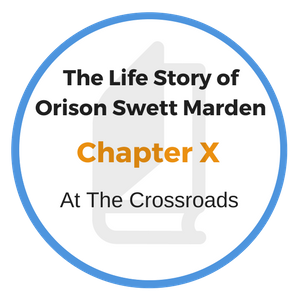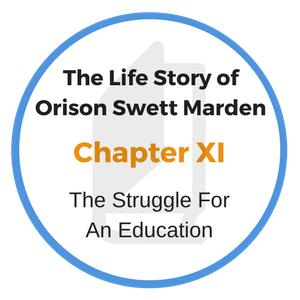- Home
- Self Growth Library
- Orison Swett Marden Chapter VIII
Orison Swett Marden Chapter VIII
Two Friends - Human and Canine
The Life Story of Orison Swett Marden Chapter VIII.
In his little book, "I Had a Friend," Doctor Marden says: "I regard him as my best friend, he who stimulates me to think the higher thought, to do the helpful deed, which, without his inspiration, would never have materialized.
Such a friend did he find in the Foss home at a most critical period in his life. The elder of Mr. Foss's two daughters, Arabel, a girl of refined nature and high aspirations, was kind to her father's "hired boy" and sympathized with him in his ambition for an education. She herself was hungry for knowledge and secretly cherished an ambition, opposed by her father, to go to Boston for study and self-improvement.
Not since his father died had such a gleam of sunshine and happiness come into the gray life of the friendless orphan-lad as this girl's sympathy and friendship brought him.
Older by some years and more mature than the boy, she helped and encouraged him to read, and to find books wherever possible. So, like Abe Lincoln, he scoured the countryside for any stray books that were to be borrowed, and read them in his attic, by the light of a candle, at early dawn, Sundays, when he was not doing chores, and at every odd moment he could get.
Foss, who had as little sympathy with his daughter's aspirations as with Orison's, frowned upon all such nonsense as "book learnin'." He boasted that he had none himself, that he had never gone to school but three months in his life, but that he could hoe his row with any of those who had their heads filled with such trash.
A hard worker, he had no faith in anything but "rawbone labor," as he called it, and he drove others as he drove himself. He resented Orison's ambition for book "nonsense," and saw to it that it didn't interfere with the fullest performance of his tasks.
He seemed to resent, too, another source of happiness and companionship that had come into the boy's life, his little dog, Ring. Although, for some unknown reason, he allowed the dog to remain, he abused the poor animal at every opportunity.
Next to the companionship of Arabel Foss, Orison prized that of Ring. He was as fond of animals as he was of Nature, and often he risked arousing the fury of his master by trying to minister to the poor creatures who were mis-treated.
He would go to the barn after dark, to bathe their wounds and apply what liniment or salves he could find to relieve their suffering. Upon Ring he poured out all the love of his starved young heart, and Ring responded with that whole-hearted canine devotion and faithfulness which so often put to shame a narrower human affection.
During the winter season, work was harder for the youth than in the summer. He rose at four o'clock in the morning, and, before breakfast, fed the oxen, took care of the rest of the stock and did some chores about the house. After breakfast he yoked the oxen to the big sled, and, taking Ring with him, started for the logging camp in the mountains. There he labored until dark, hauling large spruce and hemlock logs down the mountainside to the icebound river, to be ready to float to the mill.
"He is a real friend who touches my life to some purpose, who opens a little wider to me the doors of opportunity, and makes a larger life possible.”
- O.S. Marden
While the young lumberman worked, Ring, wild with joy, ran about him
and chased the squirrels up the trees or over the frozen snow, which, in
some places, was four or five feet deep.
When it came dinner time — and the worker was hungry long before noon — Orison would shovel the snow away from the side of a tree, build a little fire with dry sticks and branches, and thaw out his frugal dinner, which was often frozen solid. But the brown bread and baked beans of which it usually consisted, with sometimes a bit of salt pork added, tasted very good to a boy with a voracious appetite and a dog equally hungry. For, although the boy didn't always have as much as he would have liked, he never failed to share with his little canine friend, often giving him more than a fair share.
During the winter season the roads down the mountainside were so slippery that Orison was obliged to use a snub rope in moving the lumber over the steepest slopes. Describing what lumbermen call "snubbing," he says:
"I had a large two-inch rope, about one hundred and fifty feet long, one end of which I would make fast to the sled, and then wind the rope several times around a tree. While I held the loose end in my hands, my assistant would drive the oxen down the mountainside. After we had gotten down one hill we would often have to change the rope to another tree, and so let the rope out down the steepest places until we got to the bottom.
"Snubbing on the mountainside when a cold snap after rain would make the roads as smooth as glass was very dangerous. Once, while snubbing on the steepest part of the mountain, the rope broke and the enormous load of logs rushed down with terrific speed, hurling the oxen around the sharp bend at the foot of the hill with such force that they were actually left hanging from their yokes, high up in the tree against which the load had struck. The poor animals were so terribly injured that we were obliged to climb into the tree and knock them in the head to put them out of their suffering."
It was sometimes as late as ten o'clock when the boy had finished his chores and eaten his supper. After days of such strenuous toil the nights seemed all too short; and when, in the cold, dark morning, his employer would call to him in his attic that it was time to get up, he could scarce believe that he had been more than an hour or two in bed.
He suffered much from cold feet during those below-zero winters. The snow and rain would go through the holes in his cowhide boots, wetting his feet thoroughly, so that it was hard work to keep them from freezing. He would leave his boots in front of the fireplace to dry before going to bed at night, but most of the time they would still be wet when he put them on in the morning. Then, when he went out, they would freeze stiff and his feet would become sore and blistered.
It was no use to speak about this, or to ask for new shoes. Foss would only bluster and protest that he didn't know what the younger generation was coming to; that boys and girls wanted luxuries that would have been considered ridiculous in his boyhood. Or he would say sneeringly: "What next? You will be wanting an overcoat, and perhaps even a horse to carry you to the mountain!"
There were occasions when he asked for clothes when blows took the place of sneers and taunts.
One winter, feeling that, since he did so much hard work without adequate compensation, he should at least be given enough clothes to keep him warm, he asked for some heavy flannels and an overcoat. The man went white with rage, called him a lazy, good-for-nothing, and, taking down a big rawhide whip from over the fireplace, chased him from the house.
Although temptation to rebellion against such treatment must have been steadily growing within him, there seemed as yet no way of escape from his intolerable position. Then something happened that put all thought of escape out of his head for the moment, and for months to come. He lost his little friend Ring!
The poignancy of this tragedy — for it was a real tragedy in the boy's life — deeply affected him. Ring was the one living creature who looked up to him and loved him more than anybody or anything else in the world.
"The will to succeed is half the battle in whatever we undertake."l to succeed is half the battle in whatever we undertake."
- O.S. Marden
The little dog was his chum, his confidant, his loyal friend, who, if need be, would sacrifice his life for him. When Ring had trotted at his heels or scampered in front of him, he felt the solace, the joy of companionship. Again and again he had shared his last morsel with his loyal friend. When the snow had seeped in through the cracks in the attic, Ring had nestled at his feet on the bed, and they had helped to keep each other warm. They had shared each other's joys and sorrows. They had understood each other's language, and with the dog the boy seemed to have lost a part of himself.
"It does not seem possible," said the man, in after years, "that a dog and a boy could become so attached to each other as we had, but he really seemed a part of myself. Many a night I went to bed hungry because I shared my supper with him. But he always seemed to understand, and he was so grateful for it all, that I never begrudged him anything I had."
It was night when he discovered his loss and too late to make any effective efforts to find his "shaggy friend." He had gone all around the mill and the farm, as far as it was safe to go at night, whistling and calling to him, but without result. Heartsick, he went up to his attic, but vowed to himself that he would find Ring — if he were alive.
The boy undressed and went to bed, but he could not sleep. For hours he lay awake, torturing himself with the thought of what might have happened to Ring.
He knew that, if alive and at liberty, his pet would find his way back to him.
"Obstacles are like wild animals. They are cowards but they will bluff you if they can. If they see you are afraid of them... they are liable to spring upon you; but if you look them squarely in the eye, they will slink out of sight."
- Orison Swett Marden
Orison Swett Marden Chapter VIII , continued...
Since he hadn't returned, something dreadful must have happened. Perhaps somebody was holding him prisoner, and he couldn't get back. Then he would picture Ring tugging at his chain, and howling and whining for his master.
Next he would start up at the thought of a new horror. Perhaps Ring had been caught in a trap. There were many of them set for the wild animals which, desperate with hunger, often made raids upon the valley in winter time. Or maybe he had been torn to pieces by one of these hungry creatures!
As Arabel was the only one of the family who had a fellow feeling with Orison in his aspirations for an education, so was she the only one who sympathized with him for "being such a fool as to make all that fuss about a dog." Her mother told him that he "must be crazy," and that "the dog was no good anyway."
The girl herself had very little opportunity to see him, but whenever she could get a moment alone with him, she told him how sorry she was, and how, if she could help him in any way to find Ring, she would do so.
Sunday was about the only day he got an opportunity to make a special search for the dog. At the time of his disappearance, Orison had gone to the neighbors all around to question them as to whether they had seen Ring, and to beg them to be on the lookout for him. Over hills and mountains, upstream and downstream, in the dense forest and in the open clearings, everywhere he could go, he patiently searched for his lost comrade.
Months went by and he was beginning to lose hope of ever seeing him again. It was a holiday — the Fourth of July. He had tramped many miles through forests and over mountains to a lonely valley, apparently uninhabited. There he stopped, whistled, and called loudly to Ring, as he had kept doing, at intervals, all through his search. He looked up to the hills in front of him. Something caught his eye. In an instant his heart was in his mouth. Could it be Ring?
He dared not hope. But again he whistled and called him by name. Then something that was moving stopped instantly, threw up its head, and looked in the direction whence the sound came. The boy whistled again and called aloud, — "Ring! Ring!" The little animal leaped into the air and came bounding toward the boy with lightning speed. In a moment it was in his arms, licking his face and whimpering with joy. It was Ring!
Orison sat down with the dog in his arms and cried like a baby. It would be hard to tell which was the happier, the boy or the dog. Both were so overcome with emotion that they didn't notice the boys who were coming down the hillside after Ring. Orison couldn't take his eyes off his newly recovered treasure, and the dog gazed into the eyes of his newly found young master with the pathetic devotion and gratitude that only a dog can show. They had a few moments of absolute joy. Then came the boys!
They had kidnapped Ring. In chasing some wild creature of the woods, he had wandered a great distance away from the mill. Farmer Webber's boys ran across him, patted him, and lured him to their home. There he was kept by force, and when the boys took him out in the woods they watched him very closely, lest he should run away.
They came rushing toward Orison and his dog, insisting that Ring was theirs and that they must have him. Orison would not give him up, but consented to go with them to the Webber home, feeling sure that the farmer would willingly give up the dog to his rightful owner.
He was mistaken. Farmer Webber would not admit his ownership. To every appeal of Orison he said no. He claimed that the dog belonged to them, that they wanted him, and meant to keep him. The children had become attached to him; he watched the premises at night, and as they lived up in the woods so far away from neighbors, he could not think of letting him go.
The boy steadfastly refused to give up his dog, and when they tried to take him away, Ring clung closer and closer to his master. Physically, however, the boy was no match for the man. He forcibly took the dog from him, put a rope about his neck, hauled the quivering animal away, and tied him to a tree.
Heart-broken, the boy turned away, feeling desolate in having found his little friend only to lose him again. But, with the tears streaming down his face, as he started back on the long, perilous homeward journey, he resolved that, even if it took years, he would never give up until Ring was again his.
After some days of thinking and turning over various schemes in his mind, he decided to go to Webber and try to buy his dog back from him. He told the man that, if they could agree upon a price, he would sign a contract, binding himself, at any sacrifice, to pay every cent of it. He was getting only small wages in cash at the time. But what did that matter? He cared not what the cost would be, he must earn the price of Ring's ransom.
"Our mental attitude, our heart's desire, is our perpetual prayer which Nature answers."
It was at this crisis that Arabella Foss came to his aid. When he told her all about finding Ring, Farmer Webber's refusal to give him up, and what he was planning to do, she at first tried to dissuade him from his plan. She thought that Webber would ask an exorbitant price, and that, anyway, working as he did, it would be impossible for him to get time to earn the money. But, when Orison refused to be moved from his purpose, she insisted on going over the mountains herself to plead with Webber to make the ransom as reasonable as possible.
One day, when her father and mother were away from the home on business, she managed to get to his place with a neighbor who happened to be going in that direction with his team.
Webber was resolute in getting all he could, and with their joint efforts the best bargain the boy and girl could make was set forth in the following contract which Webber signed that day and gave to Arabel for Orison:
"In consideration of the promise of Arabel Foss to give music lessons to my daughter once a week for twelve weeks, I agree to accept twenty-five dollars in cash from Orison Marden in payment for Ring."
(Signed) JOHN WEBBER.
Arabel, who was very fond of music, had bought a parlor organ on the installment plan. Whenever he had had an odd bit of leisure Orison had picked blueberries on old Bald Nob mountain, to help her meet her installments. Therefore, she had generously offered to give Webber's daughter music lessons, so as to help Orison pay Ring's ransom.
The boy was delighted at the prospect of getting Ring back. But how could he earn twenty-five dollars? That was the rub. It was an enormous sum in those days, a fortune, for a boy situated as he was. However, the will to do it was there — and the will to succeed is half the battle in whatever we undertake.
He decided that, if Mr. Foss would permit him, he would make cider and sell it to the Compton Village people. When he was through with his day's work he could pick the apples by the light of a lantern.
Foss made a bargain with him, allowing him the apples and the use of the cider mill if he would agree to give him a certain percentage of the cider. To this the boy assented. He boiled the cider down by using the slabs and waste lumber from the mill.
So much overwork at night began to tell upon his health, but he managed to make quite a number of barrels of cider. Apples were plentiful that year, however, and after paying Foss his percentage and another toll to one of the neighbors for carting the cider to the village, he netted only about ten dollars from his enterprise.
This was not half the sum required, but his optimism visualized the other fifteen dollars as already won. His hope and confidence rose, and the assurance of being able to get Ring back was a stimulus to renewed effort. He knew he would succeed, and although there was not left a single spare moment in which to hunt for books, his mind was again free to think along his favorite lines, how to get an education, how to push his way beyond the limitations that hemmed him in from all that his soul desired.
He spoke out of the fullness of experience when, in after years, he wrote: "Our mental attitude, our heart's desire, is our perpetual prayer which Nature answers. She takes it for granted that we desire what our heart asks for, that what we want we are headed toward, and she helps us to it. People little realize that their desires are their perpetual prayers, not head prayers, but heart prayers, and that they are granted."
Nature at the start had given him a logical mind. He knew that, just as all the longing in the world would never bring Ring back to him without paying the full price of his ransom, so the longing for an education without determined effort to realize it would be but idle dreaming. His power of visualization was one of the most potent factors of his success in realizing his dream to benefit men.
He believed, with Ella Wheeler Wilcox, that:
"The thing thou cravest so waits in the distance, Wrapt in the silence unseen and dumb, Essential to thy soul and thy existence, — Live worthy of it, call, and it shall come."






